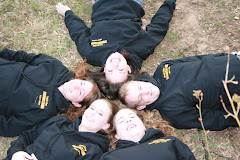
Last week, during our Bonner Meeting, we engaged in activity entitled, "Fishbowl Discussions" in order to define our own communities. Prior to the discussion, we established the definition and description of what a community encompasses.
"A community can be any group of individuals or families working toward a common goal. A community may include, but is not limited to, a town, a city, a neighborhood, an office, an industry, a profession, a school, a religion, a corporation, a geographic or a political entity. People live in communities. But the real importance of 'living in community' is that people - and groups of people - develop the ways and means to care for each other, to nurture the talents and leadership that enhance the quality of community life, and to tackle the problems that threaten the community and the opportunities which can help it."
The fishbowl exercise allowed us the opportunity to look deep inside a community that we may not find ourselves a part of. We are on the outside looking in. Often times this causes mis-understandings and mis-interpretations. Yet after getting a deeper look into the community you may have found yourself opening up your minds and changing your opinions on how you will choose to act towards that particular community. With our discussion in mind, I ask that you reflect and answer two of the following questions:
1. What, if anything, will you change about yourself because of the fishbowl activity?
2. Do you ever wish you did not belong to a community of which you are a member? Why?
3. What did you learn by listening to those who were discussing their communities?
4. For those who discussed their communities, what was the hardest part about sharing your experience?
Everyone Answer: As a Bonner you most likely will be placed into an entirely new community of people who might seem like an unlikely match. Please explain the community at your service site...explain your mis-understandings of that community...and explain the various ways which you can relate and continue to relate to your particular community.

